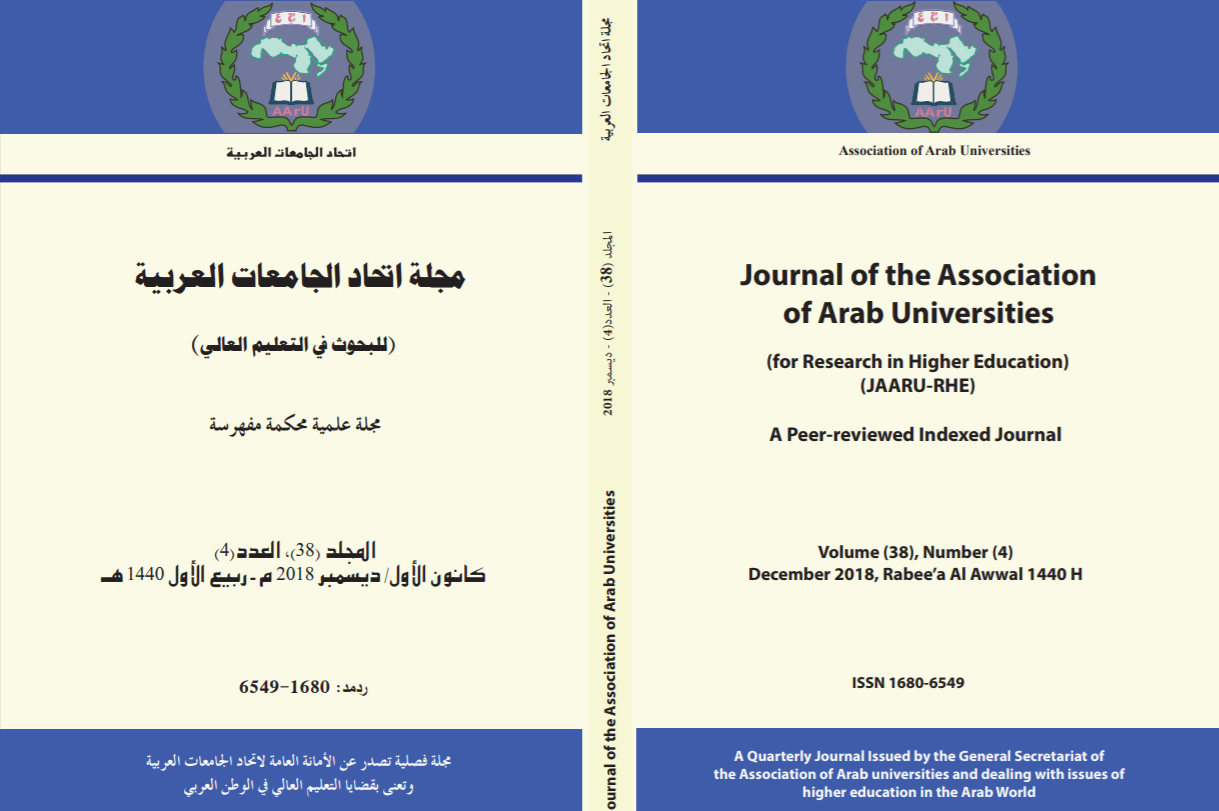Journal of the Association of Arab Universities for Research in Higher Education (مجلة اتحاد الجامعات العربية (للبحوث في التعليم العالي

Abstract
هدف المقال استقصاء أثر تقنيتي الواقع المعزز والرحلات المعرفية على التحصيل وتنمية مهارات التفكير التأملي لطلبة الصف الثامن في مادة العلوم في الأردن. وتم اختيار عينة الدراسة بالطريقة العشوائية من طالبات مدرسة الحصاد التربوي، حيث تكونت من (60) طالبة، تم تقسيمهن إلى مجموعتين تجريبيتين الأولى درست بتقنية الواقع المعزز وعددهن (30) طالبة، والثانية درست بتقنية الرحلات المعرفية وعددهن (30) طالبة، وتمثلت أدوات الدراسة باختبار تحصيلي تكون من (25) فقرة (اختيار من متعدد) واختبار للتفكير التأملي تكون من (20) فقرة (اختيار من متعدد)، ولتحقيق أهداف الدراسة اعتمد المنهج شبه التجريبي. وأظهرت نتائج الدراسة وجود فرق ذات دلالة إحصائية عند مستوى الدلالة (α=0.05) في التحصيل الدراسي وفي التفكير التأملي ولصالح طالبات المجموعة التي درست بتقنية الواقع المعزز، وقد أوصت الدراسة بتوفير المستحدثات التكنولوجية في الغرف الصفية، وتدريب المعلمين على كيفية توظيفها في العملية التعليمية
The article aimed to investigate the effect of Augmented reality and Web Quest technologies on Achievement and developing reflective thinking skills for eighth grade students in science.. The study was applied in educational Alhasad schools on eighth grade students and the study sample was chosen randomly and consisted of (60) female students divided into two experimental groups, the first studied using the augmented reality technique and their number is 30 students , and the second group studied using the web quest technique and their number is 30 students .The study tools were an achievement test consisting of 25 items ( multiple-choices) and reflective thinking test consists of 20 items ( multiple- choices ), To achieve the objectives of the study, the researcher adopted a quasi-experimental method. The results of the study showed that there were statistically significant differences (α = 0.05) in achievement and in reflective thinking to favor of students of the experimental group who had learned with augmented reality technology. It also recommended providing technological innovations in the classroom and training teachers how to employ them in the educational process
Recommended Citation
Alshalabi, Haneen E.; Hileh, Moh’d Mahmoud; and Wahba, Fatima A.
(2024)
"أثر تقنيتي الواقع المعزز والرحلات المعرفية على التحصيل وتنمية مهارات التفكير التأملي لطلبة الصف الثامن في مادة العلوم في الأردن,"
Journal of the Association of Arab Universities for Research in Higher Education (مجلة اتحاد الجامعات العربية (للبحوث في التعليم العالي: Vol. 44:
Iss.
1, Article 7.
Available at:
https://digitalcommons.aaru.edu.jo/jaaru_rhe/vol44/iss1/7

